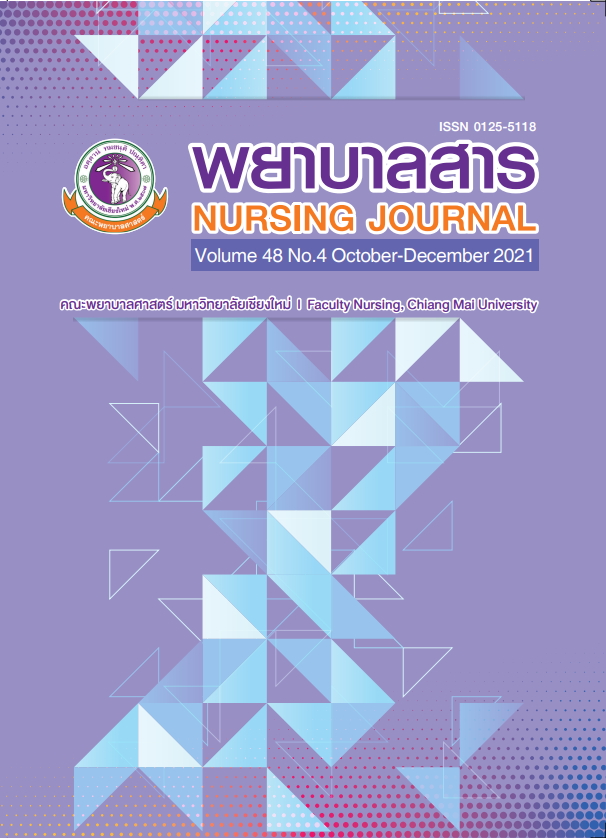Effects of the Motivation Program on Dietary Behaviors and Blood Sugar Level Among Uncontrolled Diabetic Persons
Keywords:
Blood Sugar Level, Dietary Behaviors, Motivation Program, Uncontrolled Diabetic PersonsAbstract
This quasi-experimental research aims to compare the average dietary behavior scores and blood sugar levels between the experimental group before and after participation in a motivation program, and the control group that received normal hospital service. The sample group of 48 uncontrolled diabetic people is comprised of a control group and an experimental group of 24 people each. The tools consisted of an eight-week motivational program which aimed to prevent complications in uncontrolled diabetic people, and was developed from Roger’s concept of Protection Motivation theory (1986) which includes 4 steps: 1) promoting perceived severity of complications from diabetes; 2) promoting perceived risk of diabetes complications; 3) expectations for the positive effects of dietary behavior adjustment; and 4) expectations for their own ability to adjust dietary behavior, dietary guide, and blood sugar meter. Data were collected via three instruments: a demographic data questionnaire, a dietary behavior questionnaire (CVI = 0.96) and a blood sugar record (CVI = 1.00) with a reliability coefficient value of 0.81. The data was then analyzed using Wilcoxon for the dependent sample and the Mann Whitney U test for the independent sample. The results showed that after participating in the motivation program, the experimental group displayed significantly higher than average scores for dietary behaviors than before participating in the program (p = .001), and higher than those of the control group which received normal hospital services (p = .331). After the program was finished, there was also a significant reduction in the blood sugar levels of the experimental group compared with before their participation in the program (p = .005), and compared with that of the controlling group which received normal hospital services (p = .010). The outcome suggests that motivation programs can be recommended for motivational adjustment of the dietary behavior of uncontrolled diabetic people which could effectively lead to reduction in blood sugar levels.
References
American Diabetes Association. (2008). Diagnosis and classification of diabetes mellitus. Diabetes Care, 31(1), 51-60.
Bandura, A. (1977). Social learning theory. New Jersey: Prentice-hall.
Dashti, S., Dabaghi, P., & Tofangchiha, S. (2020). The effectiveness of training program based on protective motivation theory on improving nutritional behaviors and physical activity in military patients with type 2 diabetes mellitus. Journal of family medicine and primary care, 9(7), 3328–3332.
Diabetes Association of Thailand. (2017). Clinical practice guideline for diabetes. (in Thai) Retrieved from https://www.dmthai.org/attachments/article/443/guideline-diabetes-care-2017.pdf
Division of Non Communicable Diseases. (2020). Information of non communicable disease. (in Thai) Retrieved from http://www.thaincd.com
Duangkrat, K., Labwongwattana, P., & Chansatitporn, N. (2019). Improvement of self-management program in uncontrolled type II diabetes patients. Journal of Health and Nursing Research, 36(1), 66-83. (in Thai)
Fuengfung, S. (2015). Effect of a diet control program using food exchange on knowledge, health behaviors, and blood glucose levels among persons with type 2 diabetes in district health promoting hospitals. Journal of Public Health nursing, 29(3), 34-49.(in Thai)
International Diabetes Federation. (2013). Managing older people with type 2 diabetes global guideline. Retrieved from http://www.diabeteswatch.org/idf-global-guideline-for-managing-oilder-people-with-type-2-diabetes
Kampalikit, S., & Baramee, J. (2012). Health promotion guidebook in Bachelor of Nursing course. Khon Kaen: Faculty of Nursing Khon Kaen University. (in Thai)
Kusirisin, W. (2003). Self care in nutrition and health and blood sugar level of non-insulin dependent diabetes mellitus patients. Chiang Mai: Chiang Mai University. (in Thai).
Methakanjanasak, N., Phanphruk, W., Karuna, S., & Limumnoilap, S. (2014). The effect of motivational program on blood glucose control in type 2 diabetic patients. KKU Research Journal. 3(6), 91-101. (in Thai)
Nararom, S. (2009). Application of protection motivation theory and social support for health care behaviors modification of non-insulin dependent diabetes mellitus, Tambon Nongtoom, Muang, Khon Kaen. (Master of Public Health Program). Graduate School, Khon Kaen University. (in Thai)
Norman, P., Boer, H., & Seydel, E. R. (2005). Protection motivation theory. United Kingdom: Open University Press.
Nukulkit, S., & Sareerat, T. (2018). Effectiveness of health promotion program with group process on the self-care behaviors modification of type 2 diabetic patients at Sukkasem Community Health Center, Tambon Tatcheungchum, Muang, Sakon Nakhon. Jourmal of Sakon Nakhon Hospital. 21(1), 77-86. (in Thai)
Public Health Amphoe Sarapee. (2020). Documentation for monitor of public health 2562. (in Thai) Retrieved from https://www.chiangmaihealth.go.th/cmpho_web/document/190710156274504289.pdf
Rogers, R. W. (1986). Protection Motivation Theory. Health Education Research Theory and Practice, 1(3), 153-161.
Seangdand, S. (2017). Self-care behaviors of patients with uncontrolled DM. The Southern College Network Journal of Nursing and Public Health. 4(1), 191-204. (in Thai)
Srisaket, J., Chaisa, P., Wanchai, A., Meeboonmak, Y., & Pokwangyut, W. (2017). Diet consumption behavior modification patterns to control blood sugar levels of patients with diabetes in Thailand: A systematic review. EAU Heritage Journal Science and Technology. 11(2), 156-170. (in Thai)
Wannapeera, W. (2012). Home visit and home care. Pitsanulok: Faculty of Medicine, Naresuan University.
Wannasang S., Nithiyanan W., & Deerojanawong C. (Eds.). (2007). The situation of diabetes in Thailand. Bangkok: Wiwat Press.
Wattanakul, B., & Nhamkam, S. (2014). Risk perception, T2DM, diabetes complications. Journal of Nursing and Health care. 32(3). 61-68. (in Thai)
Yimniam, R., Tanvatanaluk, V., & Kijpreedarborisuthi, B. (2018). Effects of lifestyle change pattern program having motivation on disease prevention and blood sugar control of potential diabetes risk group of people of Bangkhla District, Chachoengsao Province. Journal of the Department of Medical Services. 43(2), 118-123. (in Thai)
Young, E. E., & Unachukwu, C. N. (2012). Psychosocial aspects of diabetes mellitus. Journal of Diabetes Medicine, 20(1), 5-7.
Downloads
Published
How to Cite
Issue
Section
License
บทความที่ได้รับการตีพิมพ์เป็นลิขสิทธิ์ของวารสารพยาบาลสาร
ข้อความที่ปรากฏในบทความแต่ละเรื่องในวารสารวิชาการเล่มนี้เป็นความคิดเห็นส่วนตัวของผู้เขียนแต่ละท่านไม่เกี่ยวข้องกับมหาวิทยาลัยเชียงใหม่ และคณาจารย์ท่านอื่นๆในมหาวิทยาลัยฯ แต่อย่างใด ความรับผิดชอบองค์ประกอบทั้งหมดของบทความแต่ละเรื่องเป็นของผู้เขียนแต่ละท่าน หากมีความผิดพลาดใด ๆ ผู้เขียนแต่ละท่านจะรับผิดชอบบทความของตนเองแต่ผู้เดียว






